Navigation in React Native: Examining and Understanding the Options
Nader Dabit
Mobile routing and navigation is hard.
- Different paradigm than web routing
- Navigation flows are hard to reproduce
- Navigation UX is different each platform
What we will cover:
- NavigatorIOS
- Navigator
- Navigator Experimental
Ships with React Native
From the Community
- React Native Navigation
- React Native Router Flux
- React Native Simple Router
- ExNavigation from Exponent
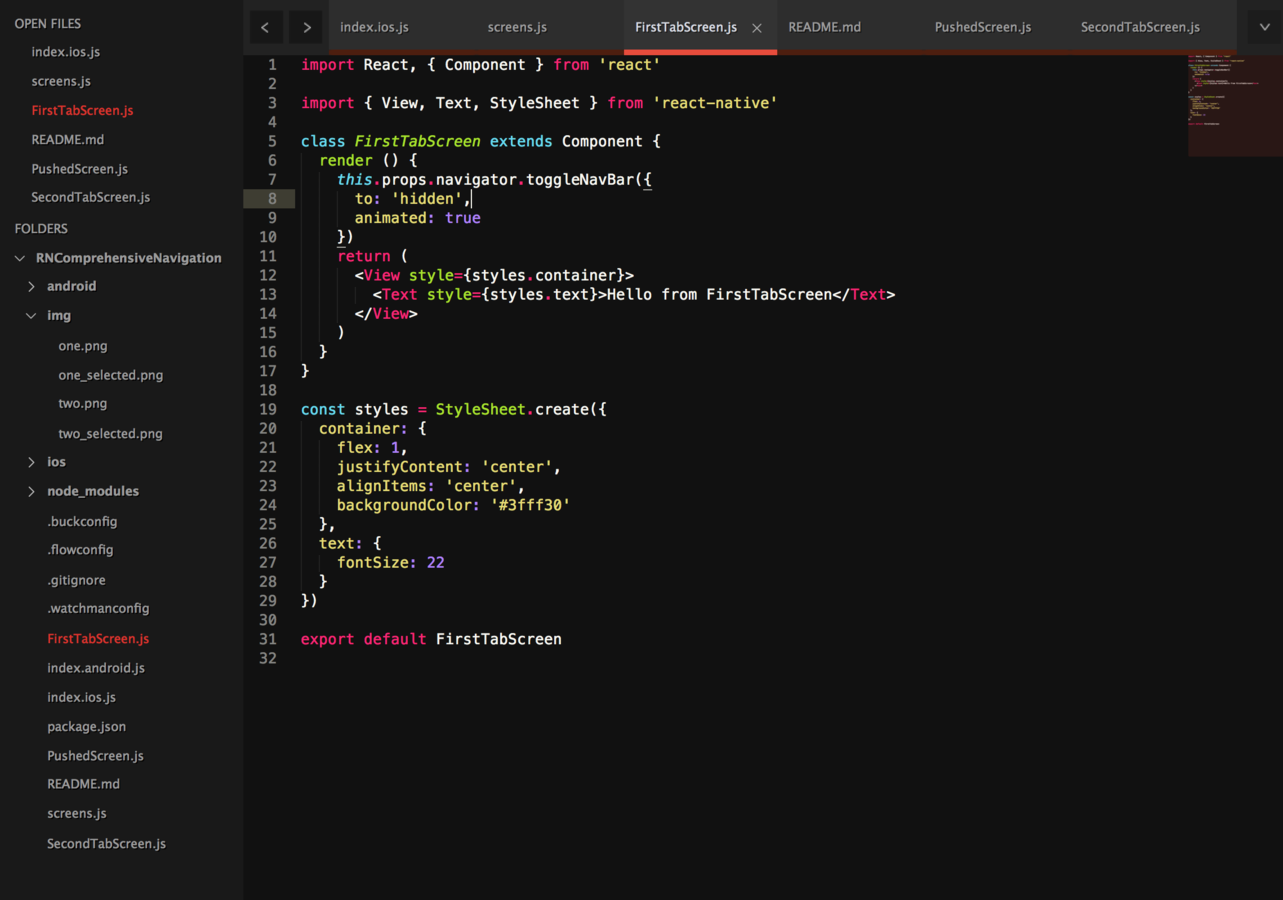
Current State of Native Implementations
NavigatorIOS
- Leverages the iOSUINavigationController class with very smooth native animations
PROS
- Easy to get started
- Intuitive api
- Great for beginners or small projects

Current State of Native Implementations
NavigatorIOS
- Not maintained by Facebook
- iOS Only
- Limited API
CONS
NavigatorIOS
Creating an instance of NavigatorIOS
import {
...
NavigatorIOS
} from 'react-native'1. Import NavigatorIOS from React Native
2. Create or import an initial route
import Home from '../pathtohome'3. Return the Navigator in render
render () {
return (
<NavigatorIOS
initialRoute={{
component: Home,
title: 'Home'
}} />
)
}NavigatorIOS
Pushing and popping to the route stack
this.props.navigator.push({
component: About,
title: 'About'
})this.props.navigator.pop()2. Popping to a previous route (go back)
1. Pushing to a new route
NavigatorIOS
Pushing and popping to the route stack
this.props.navigator.push({
component: About,
title: 'About',
passProps: {
name: 'React Camp',
city: 'New York'
}
})Passing properties
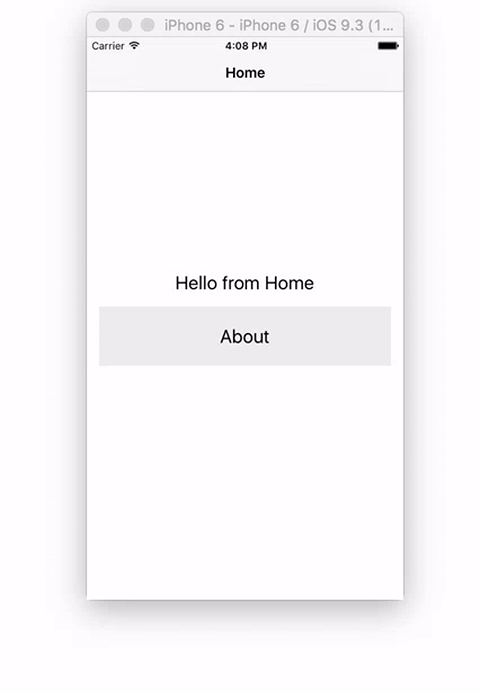

Current State of Native Implementations
Navigator
PROS
- Cross platform
- Extensive API
- Well documented
- Many examples and resources online

Current State of Native Implementations
Navigator
CONS
- Animations less refined than NavigatorIOS
- Difficult to manage navigation state
- Will soon be replaced by Navigator Experimental
Navigator
Creating an instance of Navigator
import {
...
Navigator
} from 'react-native'1. Import Navigator from React Native
2. Create or import an initial route
import Home from '../pathtohome'3. Create renderScene method
renderScene (route, navigator) {
return <route.component
navigator={navigator}
{...route.passProps} />
}Navigator
Return instance of Navigator:
<Navigator
renderScene={this.renderScene.bind(this)}
initialRoute={{
component: Home
}} />Pushing and popping to the route stack:
this.props.navigator.push({
component: About
})this.props.navigator.pop()2. Popping to a previous route (go back)
1. Pushing to a new route
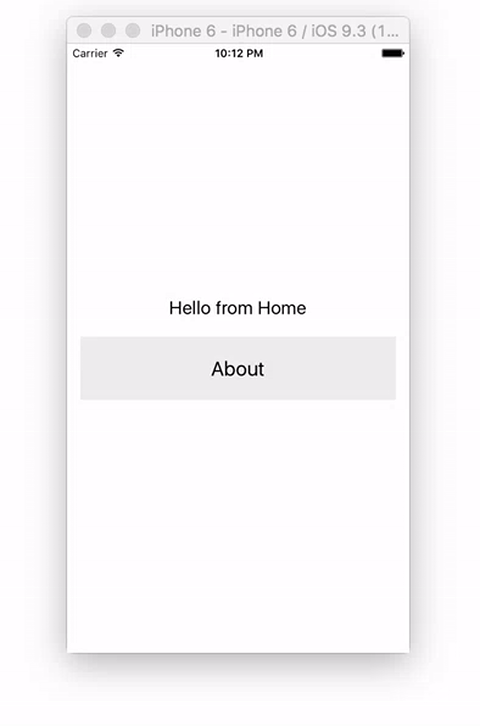
Navigator
<Navigator
configureScene={this.configureScene.bind(this)}
renderScene={this.renderScene.bind(this)}
initialRoute={{
component: Home
}} />configureScene (route) {
if (route.type === 'modal') {
return Navigator.SceneConfigs.FloatFromBottom
}
return Navigator.SceneConfigs.FloatFromRight
}1. Create configureScene method (available options)
2. Attach it to the navigator
this.props.navigator.push({
...
type: 'modal'
})3. Pass type of modal when we want a modal
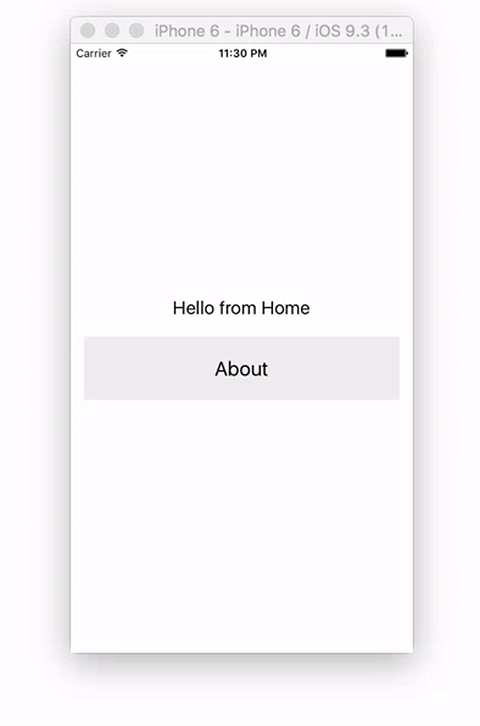

Current State of Native Implementations
Navigator Experimental
- Still in Development
- Single-directional data flow, using reducers to manipulate top-level state object
- Modular
- You can implement custom navigation views in JS or Native or you can use pre-built scene and overlay components that are meant to look consistent with platform conventions.
Navigator Experimental
Creating an instance of Navigator Experimental

Navigator Experimental
Creating an instance of Navigator Experimental
import React from 'react'
import { AppRegistry } from 'react-native'
import configureStore from './app/store/configureStore'
const store = configureStore()
import NavigationRootContainer from './app/containers/navRootContainer'
import { Provider } from 'react-redux'
const App = () => (
<Provider store={store}>
<NavigationRootContainer />
</Provider>
)
AppRegistry.registerComponent('RNComprehensiveNavigation', () => App)
Entrypoint (index.ios.js / index.android.js)
Navigator Experimental
Creating an instance of Navigator Experimental
import { POP_ROUTE, PUSH_ROUTE } from '../constants/ActionTypes'
export function push (route) {
return {
type: PUSH_ROUTE,
route
}
}
export function pop () {
return {
type: POP_ROUTE
}
}
actions/actions.js
Navigator Experimental
Creating an instance of Navigator Experimental
import { PUSH_ROUTE, POP_ROUTE } from '../constants/ActionTypes'
const initialState = {
index: 0,
key: 'root',
routes: [{ key: 'home', title: 'Home' }]
}
export default (state = initialState, action) => {
switch (action.type) {
case PUSH_ROUTE:
return {
...state,
routes: [
...state.routes,
action.route
],
index: state.index + 1
}
case POP_ROUTE:
return state.index > 0 ? {
...state,
routes: state.routes.slice(0, state.routes.length - 1),
index: state.index - 1
} : state
default:
return state
}
}reducers/navReducer.js
Navigator Experimental
Creating an instance of Navigator Experimental
import { connect } from 'react-redux'
import { push, pop } from '../actions/navActions'
import NavigationRoot from '../components/NavRoot'
function mapStateToProps (state) {
return {
navigation: state.navReducer
}
}
function mapDispatchToProps (dispatch) {
return {
pushRoute: (route) => dispatch(push(route)),
popRoute: () => dispatch(pop())
}
}
export default connect(
mapStateToProps,
mapDispatchToProps
)(NavigationRoot)
navRootContainer.js
Navigator Experimental
Creating an instance of Navigator Experimental
import React, { Component } from 'react'
import Home from './Home'
import About from './About'
import {
NavigationExperimental
} from 'react-native'
const {
CardStack: NavigationCardStack
} = NavigationExperimentalcontainers/navigationRoot.js
Navigator Experimental
_renderScene (props) {
const { route } = props.scene
if (route.key === 'home') {
return <Home _handleNavigate={this._onNavigate.bind(this)} />
}
if (route.key === 'about') {
return <About _goBack={this.props.popRoute.bind(this)} />
}
}containers/navRoot.js - renderScene
{
key: 'home',
title: 'Home'
}props.scene.route
routes: [{
key: 'home',
title: 'Home'
}]reducer initial route array
Navigator Experimental
_onNavigate (action) {
switch (action.type) {
case 'push':
this.props.pushRoute(action.route)
return true
case 'pop':
this.props.popRoute()
return true
default:
return false
}
}containers/navRoot.js - renderScene
Navigator Experimental
render () {
return (
<NavigationCardStack
navigationState={this.props.navigation}
onNavigate={this._onNavigate.bind(this)}
renderScene={this._renderScene.bind(this)} />
)
}rendering the NavigationCardStack component

React Native Navigation
Community / Open Source implementations
- Open sourced and by Wix
- App-wide support for 100% native navigation with an easy cross-platform interface.
- Intuitive and easy to reason about
- Easy to get started without too much work, much easier than navigator or navigator experimental in my opinion
- Very smooth animations because they are native
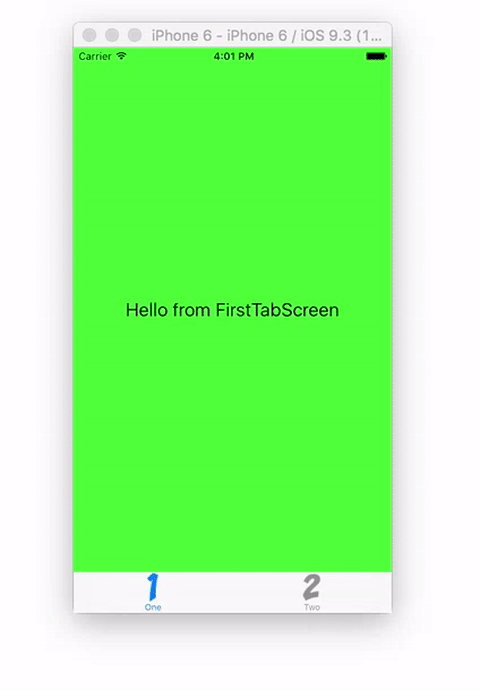
React Native Navigation
Community / Open Source implementations
import { Navigation } from 'react-native-navigation'
import { registerScreens } from './screens'
registerScreens()
Navigation.startTabBasedApp({
tabs: [
{
label: 'One',
screen: 'FirstTabScreen',
icon: require('./img/one.png'),
selectedIcon: require('./img/one_selected.png'),
title: 'Scrseen One'
},
{
label: 'Two',
screen: 'SecondTabScreen',
icon: require('./img/two.png'),
selectedIcon: require('./img/two_selected.png'),
title: 'Screen Two'
}
]
})
npm i react-native-navigation --saveReact Native Navigation
import { Navigation } from 'react-native-navigation';
import FirstTabScreen from './FirstTabScreen';
import SecondTabScreen from './SecondTabScreen';
import PushedScreen from './PushedScreen';
export function registerScreens() {
Navigation.registerComponent('FirstTabScreen', () => FirstTabScreen);
Navigation.registerComponent('SecondTabScreen', () => SecondTabScreen);
Navigation.registerComponent('PushedScreen', () => PushedScreen);
}
screens.js
navigate () {
this.props.navigator.push({
screen: 'PushedScreen'
})
}push route
this.props.navigator.pop()pop route

Community / Open Source implementations
React Native Simple Router
- Cross platform
- Open sourced by react-native-simple-router-community
- Easy to install
- Very customizable
- Also great for beginners
- Documentation is concise and easy to understand as well as the api
Community / Open Source implementations
React Native Simple Router
npm install react-native-simple-router --saveimport Router from 'react-native-simple-router'
import Home from './Home'
const firstRoute = {
name: 'Home!',
component: Home
}
class RNComprehensiveNavigation extends Component {
render() {
return (
<Router
firstRoute={firstRoute}
headerStyle={styles.header} />
)
}
}
Community / Open Source implementations
React Native Simple Router
this.props.toRoute({
name: 'About',
component: About,
passProps: {
title: 'Hello From React Camp'
}
})
this.props.toBack()Basic navigator methods
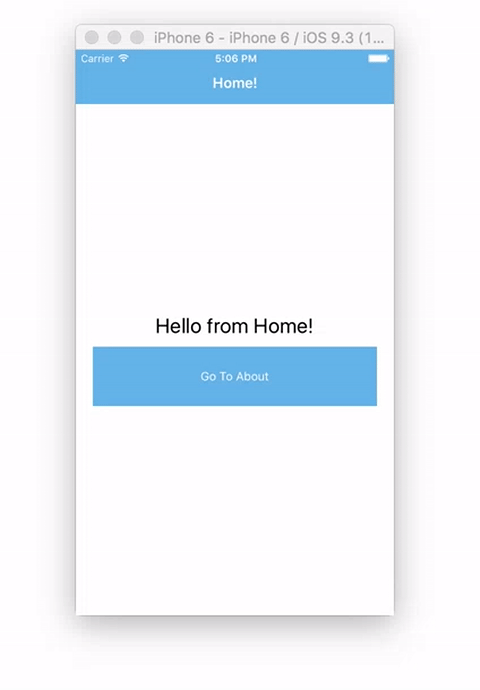
Community / Open Source implementations
React Native Router Flux
- Open sourced by Pavel Aksonov
- Built on top of the new Navigator Experimental api and will be updated as the api changes and matures
- Allows you to Define scene transitions in one central location
- Similar api to react-router if coming from web
- Call navigation actions from anywhere in the app without having to keep up with the navigator prop
- Highly customizable
- Possible to define navigation state using reducers and redux
Community / Open Source implementations
React Native Router Flux
npm i react-native-router-flux --saveimport React from 'react'
import { AppRegistry } from 'react-native'
import {Scene, Router} from 'react-native-router-flux'
import Home from './Home'
import About from './About'
import More from './More'
class RNComprehensiveNavigation extends React.Component {
render() {
return <Router>
<Scene key='root'>
<Scene key='home' component={Home} title='Home' />
<Scene key='about' component={About} title='About'/>
<Scene key='more' component={More} title='More'/>
</Scene>
</Router>
}
}React Native Router Flux
import { Actions } from 'react-native-router-flux'
Actions.about()
Actions.home()
Actions.more()
Actions.pop()
// Pass Props
Actions.more({
firstName: 'Nader',
lastName: 'Dabit',
conference: 'React Camp'
})Scenes
<Scene key='home' component={Home} title='Home' />
<Scene key='about' component={About} title='About'/>
<Scene key='more' component={More} title='More'/>Methods
Pass all props with passProps boolean
<Scene key='home' component={Home} title='Home' passProps />
Community / Open Source implementations
ExNavigation by Exponent
- Built and maintained by Exponent + contributors
- Uses Navigation Experimental
- Includes cross platform Tab Navigation out of the box
- Includes easy to implement DrawerNavigation & Tabs out of the box
- API Somewhat similar to Navigator (push, pop, replace, etc...)
ExNavigation
npm i @exponent/ex-navigation babel-preset-react-native-stage-0 --saveRouter (Create app Routes)
import {
createRouter
} from '@exponent/ex-navigation';
import Home from './Home'
import About from './About'
const Router = createRouter(() => ({
home: () => Home,
about: () => About,
}));
export default Routerimport Router from './Router'
import {
NavigationProvider,
StackNavigation,
} from '@exponent/ex-navigation';
const App = () => (
<NavigationProvider router={Router}>
<StackNavigation
defaultRouteConfig={{
navigationBar: {
backgroundColor: '#000',
tintColor: '#fff',
}
}}
initialRoute={Router.getRoute('home')} />
</NavigationProvider>
)
ExNavigation
StackNavigation Component
import Router from './Router'
const people = ['amy', 'matt', 'leslie']
export default class Home extends Component {
static route = {
navigationBar: {
title: 'Home',
}
}
_goToAbout = () => {
this.props.navigator.push(Router.getRoute('about', {people}));
}
render() {
return (
<View style={styles.container}>
<Text style={styles.welcome}>
Welcome to Home
</Text>
<TouchableHighlight onPress={this._goToAbout}>
<Text>Go to About</Text>
</TouchableHighlight>
</View>
);
}
}Home Component
ExNavigation
class SignOutButton extends Component {
render() {
return (
<TouchableOpacity onPress={() => console.log('hello')}>
<Text style={{marginRight: 15, marginTop: 12, color: 'white'}}>Sign out</Text>
</TouchableOpacity>
);
}
}
export default class About extends Component {
static route = {
navigationBar: {
title: 'About',
renderRight: () => <SignOutButton />
}
}
render() {
return (
<View style={styles.container}>
<Text style={styles.welcome}>
Welcome to About
</Text>
{
this.props.people.map((p, i) => {
return <Text key={i}>{p}</Text>
})
}
</View>
);
}
}About Component
ExNavigation
ExNavigation
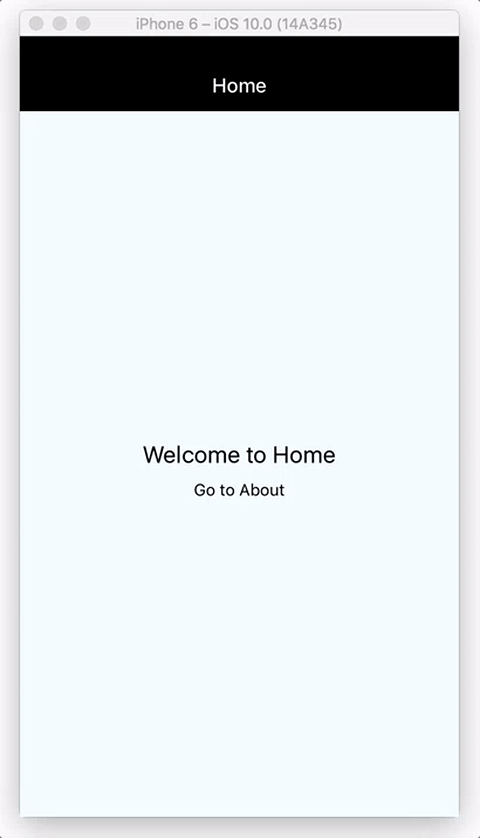

Community / Open Source implementations
React Router Native
- Built by Jake Murzy
- Uses Navigation Experimental
- Similar API to React Router
- URL Driven (easier to understand for people coming from the web)
- Cross Platform
- Enables deep linking
React Router Native
const Master = (props) => (
<View>
{props.children}
</View>
);
const routes = (
<Router history={nativeHistory} addressBar>
<StackRoute path="master" component={Master}>
<Route path="/" component={Home} overlayComponent={HomeHeader} />
<Route path="/detail/:themeColor"
component={Detail}
overlayComponent={DetailHeader} />
</StackRoute>
</Router>
);
AppRegistry.registerComponent('YourApp', () => () => routes);React Native Navigation - Takeaways
- NavigatorIOS is iOS Only
- Navigator is being deprecated - would probably not use
- Navigation Experimental is the new standard router
- Navigation Experimental uses Redux Style reducers to handle navigation state
- If you are used to React Router, try React Router Native
- If you like a more imperative approach, use ExNavigation

Comprehensive Navigation in React Native
- NavigatorIOS
- Navigator
- Navigator Experimental
- React Native Navigation
- React Native Simple Router
- React Native Router Flux
- ExNavigation
- React Router Native
Comprehensive Navigation in
React Native
Nader Dabit
React Native Radio
React Native in Action - Manning Publications